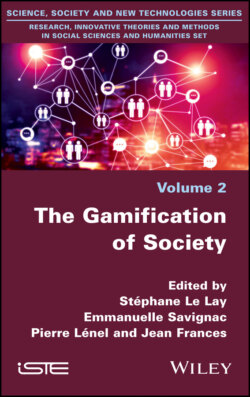Читать книгу The Gamification of Society - Группа авторов - Страница 15
1.6. Language or reality
ОглавлениеIs it a gamification of reality or language? They say it is a game, but is it enough to make games? Is the application of the idea of a game enough to define society or a company as playful, as gamified, all the more so since some people refer to gamification as the idea of a gamified society, of an omnipresence of play (or of what looks like it)?
In the 1980s, a rather similar feeling appeared in some authors’ work: the playful metaphor (La métaphore ludique) for Henriot (1989) and the playful society (La société ludique) for Cotta (1983) whose book is sub-titled The Life Invaded by Play (La vie envahie par le jeu). But using the game to speak about society, or to say that society would be playful in depth, is different. Cotta (1993) showed the growing economic importance of play, game and gambling, even if it means classifying heterogeneous activities under the play banner. There is always a tension between considering play to be ubiquitous (which would not be legitimate) and considering activities to become game or play (using a rather loose and vague notions of game and play).
This very cowardly vision of a gamification of society is the subject of a criticism that poses two problems: a notion that is not very explicit (gamification) and an absence of proof that is all the more difficult because we do not know whether we are talking about game, play, playful in a cowardly sense or something even vaguer. The more diluted the use of the notion of play becomes, the easier it is to find it everywhere. Refering to Henriot (1989), to say that everything is play is to say that nothing is play, because the notion is no longer useful. Panludism is the destruction of play. Nothing is more difficult than thinking of play as a frame for experience, without reifying the frame.
Therefore, let us not get the target wrong: let us not criticize the fact that we have made the world playful – it is not true – but let us criticize the fact that we make it seem playful, that we may say that black is white.
It is very difficult to prove under these conditions that the world would be more playful than it was. We can certainly note the importance of certain leisure activities linked to play (video games), but it is precisely this that has led to an increase or a new success of the playful metaphor, digital interaction being quickly baptized “game” or “play” because it resembles a game, whereas reality is the opposite: the game uses elements of the world, the possibilities of relationship with the digital machine to achieve its objectives. Is it a more playful world or a different kind of playful world, a world that resorts to trickery by putting play everywhere? But is it still play?
Is there really a “gameful world”? Do not we use the terms “game” and “playful” extensively (as the equivalent of fun or because of the presence of certain second characteristics of games)? In the absence of a real extension of the playful experience, it is the extension of the term(s) relating to game and play.
More than the development of the game, would not we be faced with the development of a rhetoric of the game, of the playful world? Deterding (2015) classifies these rhetorics, including those that are critical. Far from being a reality, the idea of the gamification of society, of the production of a playful world, would be pure discourse far from any testing, which is impossible because of the ambiguity of the notion – an ambiguity that Sutton-Smith (1997), from whom Deterding borrows the notion of rhetoric, had highlighted (see on this question Brougère 2005; Savignac 2017a). What characterizes these rhetorics, like Sutton-Smith’s, is that far from relying on a precise analysis of the phenomenon, it isolates a type of play or an aspect of it and then considers it to be omnipresent and significant of the development (positive or negative depending on the rhetoric) of our society. In the 18th Century, the importance of play and gambling, but also the development of calculus of chance (probabilities in our vocabulary), which emerged during the previous century from the analysis of games of chance and was applied to insurance (particularly maritime) or vaccination (or rather variolization), gave the feeling of a society where play was omnipresent. This feeling seemed to combine the development of new forms of play (nowadays video games), of which it is difficult to say whether they extended play or replaced other forms of it (and leisure), and the interpretation of reality from the idea of play (to take up Henriot’s analyzes of the playful metaphor). By retaining only one aspect of play, we end up seeing it everywhere and then developing a discourse of exaltation or criticism based on this feeling.
